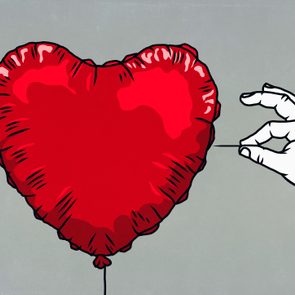How to Fix a Broken Relationship: 8 Expert Tips
Updated: Mar. 30, 2021
Before you try to fix a broken relationship, you must first know what's going wrong as a couple. Here's where you should start, according to relationship experts.
What is a broken relationship?
You might think a broken relationship is what happens when one partner cheats, is a serial spendthrift, or has a serious drug problem. But you’d be wrong, say experts. Those issues tend to be symptoms. (Here’s the difference between healthy vs. unhealthy relationships.)
In a broken relationship, “you don’t get along more than you do get along, and your overall satisfaction with the relationship is mostly low, below 50 percent,” says Rachel Sussman, a licensed clinical social worker, psychotherapist, relationship expert, and the author of The Breakup Bible: The Women’s Guide to Healing from a Breakup or Divorce. “That goes on and on for a long time.”
It can also be different for everyone. Sussman says she’s seen couples bounce back from infidelity with a stronger bond. The same is true for someone with a drug or alcohol problem (though that can be trickier).
But for the most part, it’s rarely one thing that torpedoes a relationship. “It’s usually a variety of issues that go on for a long time, where you lose hope,” she says. (If you’ve lost yours, read these therapist tips on finding hope.)
That said, relationships on the verge of collapse usually have some telltale signs. And while many relationships are salvageable, some aren’t—and yes, therapists can pretty much tell both things from the get-go.
Here is everything you need to know about a relationship that needs repair, including how to go about it.

Signs of a broken relationship
Therapists don’t always use the term “broken” to describe a relationship in need of repair. Instead, they use “dysfunctional relationship dynamics,” says Amy McManus, a licensed marriage and family therapist in Los Angeles.
“A dysfunctional relationship dynamic is a way that a couple has of communicating and relating that isn’t working to create an emotionally safe and supportive connection,” she says. “It’s often easy to see. One or both partners is unhappy, angry, and frustrated. Usually, both partners feel like the other one doesn’t hear or understand them.”
(Learn more about whether you’re in an unhealthy relationship.)
So what clues a couples’ counselor into the fact that your dynamic no longer seems to be working?
You’re not talking to one another
“Communication is the number one issue,” says Laura Louis, a psychologist and founder of Atlanta Couple Therapy in Atlanta. “Sometimes it’s a feeling of, ‘Did you hear what I said? Or does what I say even matter? Or do I matter?’ ” When it gets to the point where you’re not feeling heard, understood, or validated, disconnection can take place, says Louis.
You’re disconnected from each other
This can take several different forms. Take, for instance, couples with children. If your kids are the center of your marriage, your conversation may revolve around all the chores that come with raising kids, says Louis. “Things like, ‘Okay, would you pick up Billy? Or when are we taking Ashley to ballet practice?’ And that furthers the disconnection.”
Other worrying symptoms or examples of disconnection may include when a couple stops having sex (see these ways to overcome the obstacles to a healthy sex life) or when they don’t want to spend time together, adds Louis.
One of you has shut down
This is what Louis calls stonewalling, and it can happen when one partner gets overwhelmed by emotions or doesn’t think the other person cares enough to listen. “Someone can shut down emotionally and still come home every night. But when you ask how they’re doing, you get one-word answers,” she explains. “But sometimes I see an actual physical withdrawal where one person literally just walks away, walks out of the room, or leaves the house when their partner wants to talk about something.”
(These are the characteristics of a healthy relationship.)
Is your relationship worth saving?
Therapists will never tell you whether you should ditch your partner or stick it out. That’s up to you to decide. But they can tell pretty quickly if there are obstacles to getting your relationship back on track.
The opposite is true, as well. Experts can suss out if you’ll be able to re-establish your bond.
“A therapist will help you assess how bad the damage is,” says Sussman. “Some couples feel like the sky is falling, and then they come back the following week and tell me they had a really good weekend. And when one partner describes their weekend and I see the other person smile, that tells me there’s glue and the couple has something,” she adds.
You likely won’t make it if…
Your partner is physically abusive
Being afraid of your partner is a sign of a damaged relationship, says Sussman. And all three experts agree that physical or emotional abuse are deal-breakers. “We can’t do couples therapy in cases like this, so I really focus on making sure that the person is safe,” says Louis.
And while McManus has seen some relationships recover from domestic violence, “first the couple will need to be separated so that each person can safely do their own individual work,” she says. Not sure if your relationship fits this bill? Here are the signs of abusive relationships.
There’s no respect
“It’s difficult to save a relationship is if one partner has completely lost respect or feels contempt for the other,” says McManus. “I rarely see this in couples therapy. Couples I see are usually frustrated and angry. But I suspect that the ones who have genuine contempt for one another mostly don’t make it as far as the therapist’s office.”
Trust is another issue—if partners can’t depend on each other, they’re more likely to break up, says Sussman.
You play the blame game
“If a couple comes to me and they are 100 percent blaming the problems on the other person and they refuse to take any responsibility, I tend to think that relationship can’t be fixed,” says Sussman.
McManus agrees. “Some people just aren’t ready to look at the wounds that have led them to respond to challenges the way they do,” she says. “So then it’s much less likely they will be able to learn to communicate in a healthy way.”
But you have a good chance if…
You fight a lot
You’d think that couples who bicker constantly are doomed. Not so. In fact, it could be an indication that you’re at least making the effort to communicate with each other, says Louis.
Plus, all that fighting may motivate you to change the dynamic precisely because it’s so distressing, says McManus. (Read up on the types of arguments that end relationships.)
One of you holds out hope
Why is this a good sign for therapists? Because it means at least one half of the couple will work really hard, says Sussman. “I use the metaphor of a couple dancing on the dance floor and then one person walks away in the middle of the song. That other person has to change, too. They’re not going to just keep dancing by themselves,” she says. “So if one person’s changing, there’s hope that the other person can change, too.”
In fact, even seeing a therapist on your own will be good for the two of you. When your partner sees how much you’re getting out of it, they might decide to go on their own, says McManus. “Sometimes this is all that needs to happen—no actual couple’s therapy is necessary.”
You refrain from name-calling
This is the flip side of the couple who has no respect for each other. If you aren’t constantly criticizing your partner or saying really hurtful things on purpose, you probably are going to be more inclined to share your vulnerabilities with each other, says Louis. And doing that can bring you closer.
You have kids
Couples tend to be more invested in fixing their relationship if there are children in the picture. This isn’t always true. But Sussman has known partners who leave a relationship thinking the kids are going to be OK—and then they’re not. Or they find that they miss their children too much. “Then they come back,” she says. “And when they do, sometimes they’re more motivated to do the work.”
Others, however, think through how their lives will be when they can’t see their kids every day, notes Sussman.
You’re willing to work hard
That’s the bottom line: if both of you are willing to put in the work you can save the relationship. But you have to keep an open mind and own your piece in it, says Sussman. “When you allow yourself to be vulnerable, that’s how you really create intimacy in your relationship. And at least your partner understands why you’re doing what you’re doing and then has empathy for you,” she says.
(Here’s the quick habit to improve your relationship.)

How to fix your relationship
Go to a therapist
Well, of course, the pros would say that. But hear out their reasons: “First of all, we are trained in working with couples, watching their dynamic, being able to figure out their unique dance, and mirror it back to them in a way that they might not be able to do themselves,” Sussman says.
Therapists are also objective, in a way that family members or friends aren’t, says Louis. “Sometimes we don’t even know that we’re communicating in an ineffective way. And so that’s why it’s important to have an objective third party to really walk you through some of the patterns that you might be stuck in,” she says.
Plus, they can use science-backed data and evidence to convince you why what you’re doing (like nagging) isn’t effective, Sussman notes. To find a therapist, see what other therapists recommend you do.
Or try DIY therapy
Yes, changing the way you interact with your partner can be tough to do on your own, but it’s not impossible, says McManus. And plenty of well-known couples therapists have resources to help guide you, including websites, books, podcasts, Ted Talks, and YouTube channels. Among the therapists McManus suggests checking out: John and Julie Gottman, Esther Perel, and Ellyn Bader and Pete Pearson at The Couples Institute. “They are all fantastic resources for anyone interested in learning how to improve their relationship,” she says.
Learn how to ask for things
Instead of attacking your partner for never washing the dishes, take a different approach. “I give this example to my couples—when X happens, I feel Y. I would like Z,” says Louis. So, for example, you’d say, “When I come into the house and the dishes are everywhere I start to feel overwhelmed. So maybe we can take turns: I wash the dishes one day, you wash the dishes another day. That will make me feel really supported.”
It works because your partner feels less defensive if you avoid using words like “always” and “never” and “you” statements. Instead, focus on your emotions, as well as what Louis calls a “recipe for success.” “So instead of just leaving it with a criticism, sharing what can their partner do for things to start to feel more balanced,” she explains.
Know how to fight fairly
Does this sound familiar? In the heat of the moment, you want to talk the issue out until it’s resolved but your partner can’t deal and withdraws. That’s pretty common actually, says Louis. It could be that your partner’s emotions are running too high to deal with right now.
A better strategy, says Louis:
Find some self-soothing coping strategies
A self-soothing coping strategy to fall back on can be beneficial when you get overwhelmed. “It could include meditation, going for a walk, or taking a hot bath, but it’s really important that couples have their own strategies on what they do to make themselves feel better, especially when a conflict arises,” Louis explains.
Don’t beat a hasty retreat
Instead say, “Let’s take a break and then in 20 minutes, we can come back and talk this through when I’m feeling calm again. Because right now, I’m struggling with staying emotionally present.” It’s crucial that you set a time when you’ll be back to resolve the conflict, says Louis. If one “person just walks away, then the other person is going to feel abandoned.”
Set a reasonable time-out
If you can’t calm down in 20 minutes, then you can extend it for up to two hours, advises Louis. But don’t let that break stretch out an entire day, she says. “At that point, resentment and bitterness can start to come in where they’ve made up an entire story from their own perspective and not really got a chance to hear things from their partner’s perspective.”
Here’s another important point, says Louis: If you initiated the break, you set the tie to reconvene. That way, your better half won’t follow you around the house asking you when it’s time to talk. Now that you’ve got these steps down, here are other ways to have more productive arguments.
Start dating again
Louis recommends you spend quality one-on-one time at least once a week, preferably for two hours. No, you don’t have to go out to dinner or do anything fancy. Light candles and put on some tunes, play checkers or cards, or give each other a massage.
The key: Spend a couple of hours of uninterrupted time, she says. “Nobody’s on their phone, nobody’s on their computer, but you’re just knee to knee, eye to eye, really engaging each other.”
It’s a good way to avoid monotony—spending evenings in front of the TV, tending to the kids, or doing chores. “Especially couples who’ve been together for a while—they can get stuck into a routine,” says Louis. So Louis teaches them how to be intentional about bringing creativity into their relationship.
Next, here’s successful relationship advice to make it last.






















